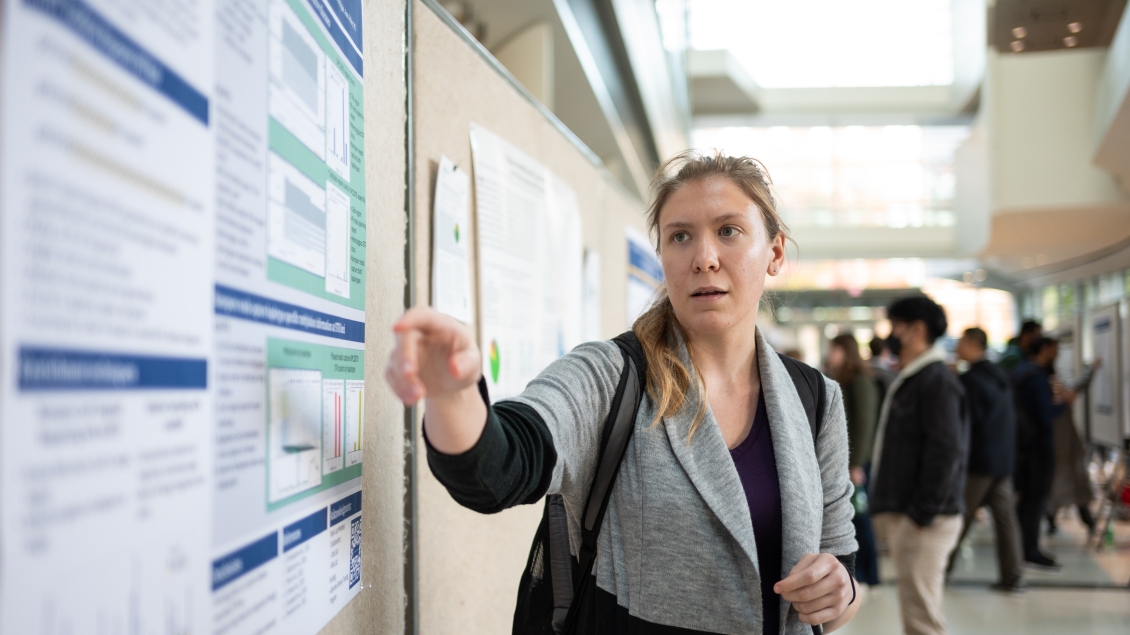
The Bioinformatics Master's Program has a long, established history of successful graduates entering the biotechnology industry or obtaining positions in an academic setting.
As a prospective Master’s degree student, you should apply directly to the Bioinformatics Program through the Rackham Graduate School at the University of Michigan.
For admission, the reviewers particularly consider:
- Some academic background in at least two of the following areas or a strong academic background in one of them: molecular biology, biochemistry, mathematics, statistics, computer science
- Proven interest in bioinformatics by taking classes, attending workshops or conferences, or working on research projects that are related to biological data analysis.
If you have any questions, contact the Bioinformatics Graduate Program at [email protected].
All application materials should be submitted electronically when possible. Applicants must meet Rackham's Minimum Requirements for Admission. The online application form can be found on the Rackham Admissions webpages. The application is available in early September through the deadline.
- GPA, minimum 3.2/4.0 (exceptions may be made if deemed appropriate)
- Letters of recommendation (3 required): Please be aware that submitting only the Rackham Recommendation for Admission Form is insufficient; forms must be accompanied by a letter from the recommender. All letters are due by the application deadline. Without them, applications will not be considered complete or reviewed by the Program Admissions Committee.
- Statement of Purpose: The Statement of Purpose should be a concise, well-written statement about your academic and research background, your career goals, and how Michigan's graduate program will help you meet your career and educational objectives.
- Personal Statement: The Personal Statement should be a concise, well-written statement about how your personal background and life experiences, including social, cultural, familial, educational, or other opportunities or challenges, motivated your decision to pursue a graduate degree at the University of Michigan. This is not an Academic Statement of Purpose, but a discussion of the personal journey that has led to your decision to seek a graduate degree.
- Resume/CV
- Transcripts: Please submit unofficial transcripts electronically with your online application
- GRE scores are no longer included as part of admission
- Applicants whose first language is not English must demonstrate English proficiency via either the TOEFL or IELTS exam. The institution code is 1839. Other exams may not be substituted. The program requires a minimum of 100 TOEFL or 7.5 IELTS. Rackham Graduate School offers a full explanation of this requirement, including exemption criteria. Please contact Rackham directly ([email protected]) with questions.
The majority of full-time Master’s students are able to complete the degree in 1 ½ years (or 3 terms). Rarely do students go beyond 2 years, unless they are a part-time MS student.
The Bioinformatics Master’s Program is comprised of both courses (a minimum of 30 credit hours), required research experience, and a research presentation. Detailed course information can be found on the DCMB training and curriculum page.
The Bioinformatics Graduate Program encourages applications from traditionally underrepresented minorities, students with disabilities, and those from disadvantaged backgrounds. There are funding opportunities and resources both from the program and other campus units to contribute to students' overall well-being while pursuing studies. Several resources available to students can be found on the Rackham Graduate School Diversity, Equity, and Inclusion website.
In addition, DCMB’s faculty members participate at events around the country, such as the Annual Biomedical Research Conference for Minority Students (ABRCMS).
Diversity is a key component of excellence, especially for solving the complex biomedical challenges that our field of computational medicine and bioinformatics faces. We believe that all people—regardless of background, race, religion, sexual/gender orientation, age or disability—deserve an equitable opportunity to pursue the education and career of their choice.
Please be aware that the Bioinformatics Program does not guarantee financial support to Master’s students. There are occasional work opportunities available that may help defray your expenses; however, we cannot guarantee the availability of such opportunities, and most will not cover tuition and living expenses in full.
Our Master's students are largely self-funded. You may apply for teaching or research assistantships, but there is no guarantee. Please note that the Bioinformatics Program offers few positions and priority is given to PhD students. A student may obtain a teaching position (GSI) in another unit.
While many Master's students get some funding, rarely is a student fully funded without some type of external award or fellowship. If interested in research assistantships, you need to contact specific faculty for those positions. Having significant programming experience is helpful.
Yes. Some students take coursework while working full time. A student is expected to complete all coursework within five years from the date of first enrollment in the program.
Bioinformatics consists of a mathematical and/or statistical analysis of a biomedical problem using computation. We define bioinformatics widely and include traditional bioinformatics areas such as for examples, systems biology, genomics, proteomics, plus statistical and evolutionary genetics, clinical informatics, and protein modeling.
As an interdisciplinary field, Bioinformatics attracts graduate students from mathematics, statistics, physics, computer science, biomedical engineering, chemistry, biochemistry and biology. Most incoming students have both a major in one and a minor in another discipline. In recent years students have entered with undergraduate training in bioinformatics or computational biology.
No. A thesis option is not available. Students are required to complete a research component (see above) and to publish that work as a scientific article in venues such as conferences or journals. Such publications should be of great benefit to students.
We find a new reason to love Ann Arbor nearly every day — year-round outdoor activities, cultural experiences, a growing food scene, and a welcoming, family-friendly atmosphere are just a few that come to mind. Explore all that Ann Arbor and our surrounding communities have to offer.